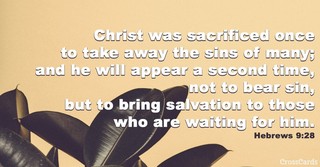
- Recent Translations
- All Translations
Yehudim in Moshiach 9:13
Share
Settings
Images for Yehudim in Moshiach 9:13

Yehudim in Moshiach 9:13 Meaning and Commentary
For if the blood of bulls and of goats
Shed either on the day of atonement, or at any other time: the former of thee, Pausanias F25 relates, was drank by certain priestesses among the Grecians, whereby they were tried, whether they spoke truth or no if not, they were immediately punished; and the latter, he says F26, will dissolve an adamant stone; but neither of them can purge from sin:
and the ashes of an heifer sprinkling the unclean;
the apostle refers to the red heifer, ( Numbers 19:1-22 ) which being burnt, its ashes were gathered up and put into a vessel, and water poured upon them, which was sprinkled with a bunch of hyssop on unclean persons; the ashes and the water mixed together made the water of separation, or of sprinkling; for so it is called by the Septuagint, (udwr) (rantismou) , "the water of sprinkling", and in the Targum in a following citation: this was the purification for sin, though it only
sanctifieth to the purifying of the flesh;
the body, or only in an external and typical way, but did not really sanctify the heart, or purify and cleanse the soul from sin. The Jews say, that the waters of purification for sin were not waters of purification for sin, without the ashes F1; and to this the Targumist, on ( Ezekiel 36:25 ) and on ( Zechariah 13:1 ) refers, paraphrasing both texts thus;
``I will forgive their sins as they are cleansed with the water of sprinkling, and with the ashes of the heifer, which is a purification for sin.''
F25 Achaica, sive l. 7. p. 450.
F26 Arcadica, sive l. 8. p. 485.
F1 Misn. Temura, c. 1. sect. 5. Maimon. & Bartenora in ib.